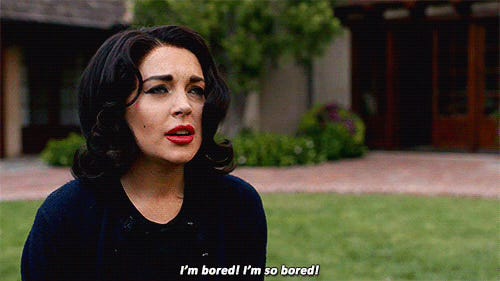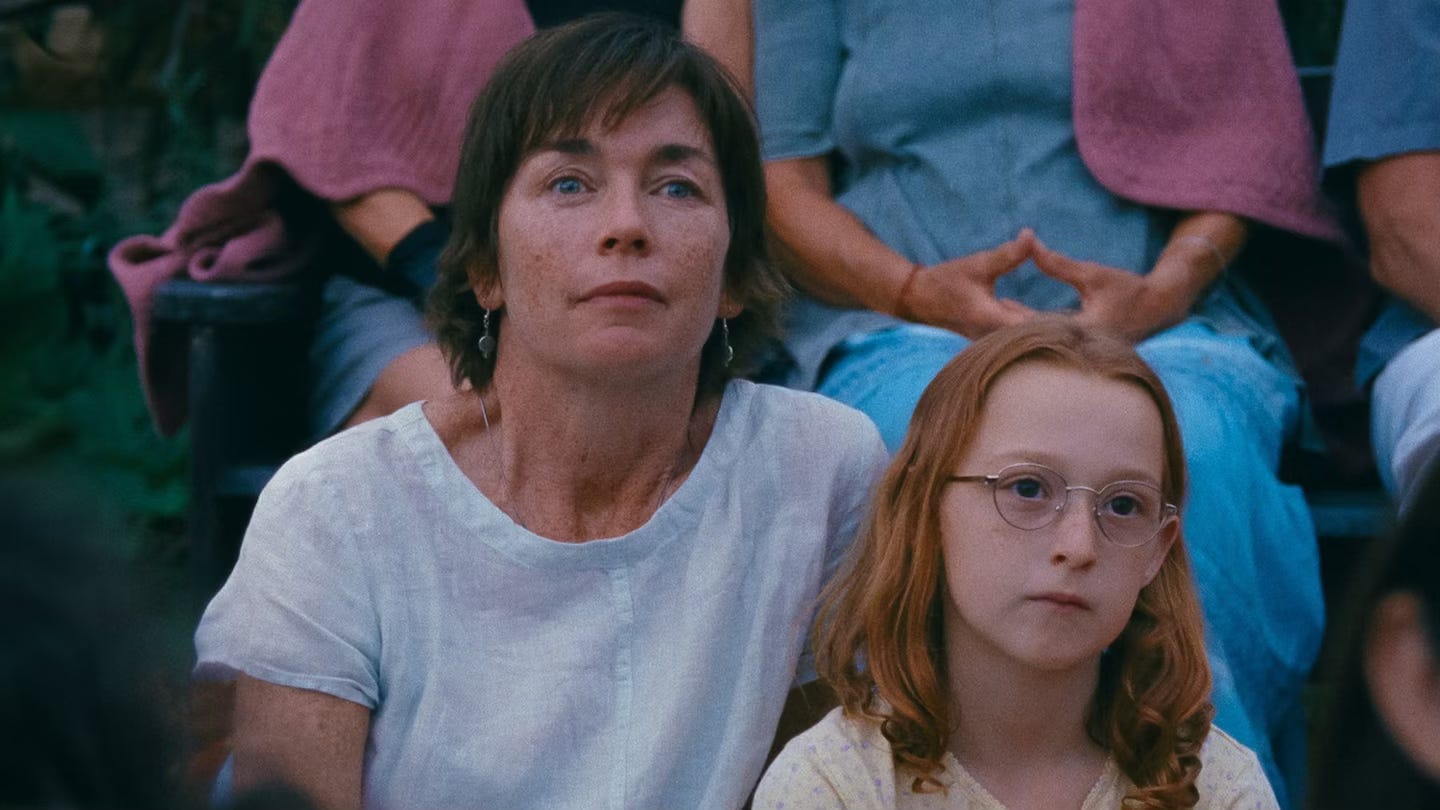Welcome to We Have to Talk, a newsletter in which Sam and George exchange their most pressing and ridiculous reflections on pop culture. Subscribe to get a hot mess of tepid takes directly into your inbox, twice a month.
This week, the boys tell themselves stories in order to live, while George rips his vape and Sam demands a moratorium on working it out with a remix.
S: Hello George and welcome back to ‘We Have To Talk’. I don’t know if you’ve been reading the tea leaves this past month, but they really have shown only one thing; just like this newsletter, everything bad is back to bore us once more.
The past few weeks alone we have had Katy Perry trying to recapture the “magic” of her Teenage Dream era with a new Dr. Luke joint, Gladiator 2 dropping a trailer that reveals it has no discernible reason to exist other than getting Paul Mescal in a tunic, Hugh Jackman back for his apparent ninth turn as Wolverine, and Lindsay Lohan kicking off another comeback attempt after a decade of false starts with –checks notes – a sequel to the largely forgotten Freaky Friday remake that they’re planning to open in cinemas? Good luck, babe! Even Charli xcx and Lorde decided to copy and paste the conversational stylings of this very newsletter in order to work it out on the remix. We’re their favourite reference, indeed.
Elsewhere in the last month’s age of regurgitation, Keir Starmer won a “landslide” by offering a reheated version of Blair ‘97 while Rachel Reeves has got busy administering Austerity 2.0.
We’ve also had the witless giallo pastiche Maxxxine careening its chaotic way into cinemas. This third film in Ti West’s post-modern slasher trilogy follows Mia Goth’s Maxine Minx as she makes the leap from porno flicks to mainstream films while being pursued by a shadowy figure from her past. The genre-bending X series, of which the film is a part, has always slathered on the metatextual layers of Mia Goth putting in a star-making turn while playing various fame-mad women desperate for stardom. This iteration, set in the belly of the beast that is Hollywood, cranks this up a notch with scenes on the Warners backlot, Psycho’s Bates Motel, the Hollywood Forever Cemetery, the TCL Chinese Theatre, and, of course, the Hollywood sign. At one point, Elizabeth Debiki, playing a film director stand-in for West, practically glares into camera while talking about the possibilities of making “B movies with A ideas,” which would be all well and good if the film had much of anything to say about stardom, desire or popular entertainment. But within the b-movie framework the series has built for itself, there’s no room for these references to blossom into intelligent ideas that cohere into a satisfying whole. It obfuscates its emptiness by pointing at other, more inventive things that went before.
It’s possible however, that I totally misunderstood the film and the multitude of references, lifeless plotting and jarring tonal shifts are actually a deliberate commentary on how the 80s saw the start of monocultural collapse and the decline of coherence in modern life. Who’s to say?
Back to the overarching point; they say those who have not learnt from history are doomed to repeat it, but I feel like – in the cultural sense – we’re doing too much studying and not enough inventing. It’s as if, while our anxiety-inducing age of climate breakdown and political upheaval hurtles past the end of the end of history, culture is deciding to circle the drain for one last victory lap of the good times.
Tell me George, is there really nothing new under the sun, or am I just about to turn 30?
G: Both, dare I say it, and I wonder if the multiplex may have just proven your point with the return of the disaster movie. Twisters, a sequel(ish) to the 1996 disaster film Twister, has received surprising raves from critics and one of the best box-office openings of the year. Perhaps some things never change: disaster movies were staggeringly successful in the 90s (Dante’s Peak, Armageddon, Deep Impact), on one level for the way technological advancements in cinema heightened audiences’ sense of awe, but also for the escape they offered from the psychological precarity of living in uncertain times - and both explanations ring as true for 1994 as they do for 2024. I also wonder if disaster movies appealed because they depicted calamities with no villains and destruction with no blame - perhaps easier to digest than the unfathomable reality we live in, where violence and destruction is real, traceable, and often paid for by our taxes. Maybe watching Acts of God like meteors, volcanos and tornadoes reap senseless violence, thus allowing for a hero’s journey of man vs nature to emerge, quells some of the - as you say - anxiety of living through a politically febrile time.
But as I type that, I have Kamala Harris in my head. We did not just fall out of a coconut tree. We exist in the context of all in which we live and what came before us. Hasn’t life always been politically febrile? Haven’t we always been circling the drain? The 90s disaster movie trend was itself a retread of the 70s and its Poseidon Adventures - but even then, perhaps I’m just trying to find neat patterns among chaos. As one of the last gays to finally read Joan Didion, I find myself always thinking about one of her best but most commonly misrepresented lines: “we tell ourselves stories in order to live”. I think people often think Didion meant that as an inspiring paean to the power of storytelling - but she was actually writing with cynicism. Referencing the often violent chaos of the cultural upheavals taking place in the 60s and 70s, Didion noticed our need for the “imposition of a narrative line upon disparate images,” as a way to “freeze the shifting phantasmagoria which is our actual experience.”
Culturally, I think this speaks to what you’re noticing - too much studying, not enough living. To pivot genres, I recently saw the charming and gentle coming of age drama Janet Planet, which follows an 11-year-old named Lacey in rural Massachusetts as she watches, with equal doses of curiosity and scepticism, her beloved mother work through three separate love affairs. The film acutely understands a child’s sixth sense for bullshit; their ability to see right through the narrative lines Didion was warning us about. It felt genuinely innovative for a well-worn genre, more lived-in and honest than many that have come before have tried. In one brilliant scene, Lacey plays a piece for her piano teacher, and is fairly average. Her teacher, in lieu of anything else to say, tells her, “I can tell you’ve been practising lots”. Bemused, Lacey hits back: “I actually didn’t practise much at all this week.”
That moment felt so representative of adult life to me: like the piano teacher, we search for white lies, create mythologies and build narratives because sometimes the honest route is too difficult. As an avoidant person, this works well for me: it’s easier to file my vaping habit under ‘Brat summer’ rather than ‘unhealthy addiction’. But in cinema, it’s often these very narratives that make great movies, when normal life is tabulated into something structured, kinetic and meaningful - even within genre cinema such as Twisters, where the relationships and character development should mean as much as the spectacle. I’m interested to know what might shake your feeling that everything is being retread, Sam - is the clarity and honesty of the likes of Janet Planet the path towards cultural innovation, or just another circle round the drain?
S - A great question George, and you know what, I may just be guilty of telling myself a story in order to write this newsletter. After all, it was only a few dispatches ago that I was waxing lyrical about the genius of The Beast, so perhaps I need to just book a few more films at Close Up to break out of this malaise. I’m actually very much looking forward to Crossing, the new film from Levan Akin of And Then We Danced fame, and I Saw The TV Glow is about to hit UK cinemas, which seems to circle the very idea we’re discussing; the perils of getting stuck in the past.
As your response suggests, every generation seems to think they’re reaching the collapse of order only to discover things continue largely as before. Didion is a great example of someone who finds mostly tedium in witnessing the would-be-revolutionaries of the 1960s and 1970s try to ransack the society she cleaved to. Similarly I’ve been tearing through Houellebecq’s ‘Whatever’ this week, which reads kind of like if P.G.Wodehouse wrote ‘American Psycho’. The book brilliantly captures the boredom of living in a neoliberal environ, as the IT-evangelist protagonist hurtles towards maximum alienation. Again, the promised “future” is really just a progression of all the shit that came before; a result of the continued “extension of the domain of struggle” into all areas of life, to quote the French title.
The more things change, the more they stay the same, so even while we have presidential assassination attempts and Brat Summer joyriding all the way to the white house, the context in which we live continues unabated. Anything you want to wrap up with George, or should be leave this rather ambivalent and long-in-the-tooth edition of We Have To Talk here?
G: Only that of all the stories that will be told in order to live through this American election cycle, I am fascinated to see whether the forthcoming fourth season of Emily in Paris dares to reference its protagonist’s feelings about the politics of her home country. Maybe her insistence on staying in Paris despite a choppy professional life and chaotic love affairs is all we need to know. Until next time, Sam!
From the Drafts:
Startling admission from House of the Dragon heartthrob Fabien Frankel in this Esquire interview, that the “naughty” Rhys Ifans will “stroke [his] sword under the table in the middle of a scene”. (G)
Fellow film journalists: stop asking celebrities about memes. Creating film and television is far too arduous for you to reduce their work by asking them if their character is “babygirl”. The second you walk into the junket, the internet does not exist. I am not fucking around. (G)
Meemaw, meemaw! What’s that? Just the sound of Glenn Close in the Hillbilly Elegambulance trying to get to the White House. (S)
More on Maxxxine; nepo-baby Lily Collins turns up with a horrifying Yorkshire accent in a two scene cameo in which she delivers a nudge-and-a-wink line about how hard it is being a working class actress from a council estate. I get it’s a “joke” but what a depressing one. (S)
Twisters is set in an alternative universe in which YouTubers are cool, academics look like models, and, despite increasingly erratic weather, no one talks about climate change. It’s dumb as hell! (G)
The Week that Was:
Sam is watching: The Boyfriend from Netflix Japan, a gay clone of Terrace House, possibly the most soothing reality show ever made.
George is reading: The Left Hand of Darkness, Ursula Le Guin’s sci-fi masterpiece about a world without gender - beguiling, thrilling and moving.
Sam is listening to: The Twisters Soundtrack. Yeehaw! Plus Rebecca Solnit’s ‘In the Shadow of Silicon Valley’, a fantastic state-of-the-nation essay first published by the LRB in February, and now available to listen to via the (free) LRB podcast.
George went and saw: Next to Normal, a musical of note for launching Meghann Fahy’s career and not much else. (I still cried though.)






